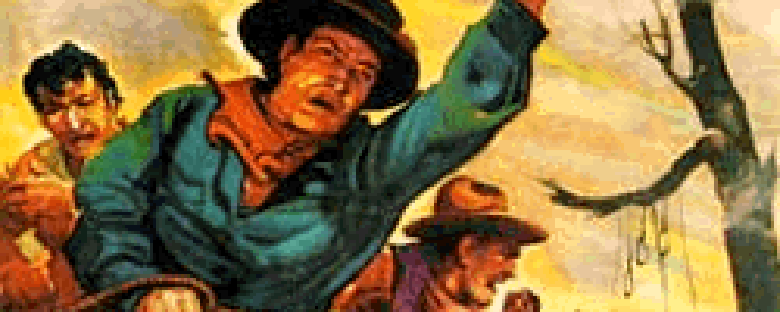Reviews
William A. Wellman
USA, 1942
Credits
Review by Matt Bailey
Posted on 11 July 2004
Source Fox Studio Classics DVD
In the movies, you can pretty much count on Henry Fonda always to do the right thing. This is the man, after all, who played Abraham Lincoln, Wyatt Earp, Admiral Nimitz, General MacArthur, and Clarence Darrow. Sure, he also played the menacing Frank in Sergio Leone’s Once Upon a Time in the West, but every actor needs to stretch once in a while. Some of Fonda’s characters, like those above, were unqualified heroes. Others, like his Tom Joad in The Grapes of Wrath and Gil Carter in The Ox-Bow Incident are more morally conflicted, yet still emerge from their particular predicaments without having condemned their souls to Hell.
The Ox-Bow Incident puts Fonda’s character at the center of an episode of Western mob violence that is the result of emotions running high and reason taking a vacation. Adapted from Walter Van Tilburg Clark’s popular 1940 novel, the film was written by Lamar Trotti, the screenwriter of some of John Ford’s more picaresque and light-hearted films, and directed by William Wellman, the director of some of the best films of Hollywood’s Golden Era. Unfortunately, the material does not play to either of their strengths, resulting in the kind of earnest, overly didactic film in which Fox specialized in churning out during the time during and directly after the second World War. As an exploration of the motivations of mob violence, it is certainly a much darker Western than audiences weaned on Tom Mix and Zane Grey were used to at the time, but the filmmakers seem not to know quite how to get their ideas across without having each of the many characters deliver sermons on what is right or wrong about hanging a man without sufficient evidence. These themes would be delved into with much more subtlety and sophistication a decade later in John Sturges’ superior Bad Day at Black Rock, although that film deals with the emotional and social aftereffects of mob violence (perhaps the more interesting approach) than with the events and struggles leading up to it.
It is not just the approach to the themes that dates the film, however. Wellman’s characteristically brisk seat-of-the-pants direction, normally a great asset to a film like The Public Enemy, works against him in this film with several scenes with approximately thirty people in the frame at any given time. Crowd scenes, it appears, were not Wellman’s strength. They are recklessly filmed with almost complete disregard for the coherence and continuity of on-screen space and eyeline matches. These scenes are also almost unbearably talky. Were it not for the horses, the script as filmed could easily be performed on the stage as a three-act play. Filmed almost exclusively on soundstages on a low budget, the film is hamstrung by its stage-bound direction. It is worth watching, though, even just for the sight of the sturdy Jane Darwell on a horse who, in her hat and dungarees, could effortlessly pass for Eugene Pallette.
I do not wish to put off anyone considering watching this film. It is full of interesting moments and characters. Of particular note is the effete, sensitive (possibly homosexual) son of the Confederate martinet Major Tetley. In the book, this character features prominently, but here he is mostly shuffled to the side. The proceedings are also significantly enlivened upon the arrival of Rose Mapen, a former girlfriend with quite a reputation played by Mary Beth Hughes. Her scene lasts only a couple of minutes, but the few lines and gestures she tosses out make for the best moments in the movie. Hughes had a lengthy career in B pictures but never really broke as a star. That is a terrible shame because it is clear, even just from her brief scene in this film, that she really had what it takes. But the annals of Hollywood are full of should-have-beens as well as should-not-have-beens. The waste of Hughes’ talents is just another example of this film’s failure to make the best of its strengths in deference to trying to teach the audience a lesson.
We don’t do comments anymore, but you may contact us here or find us on Twitter or Facebook.



